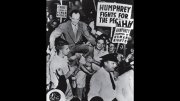At a time when the nation is riven and familiar political categories have fallen into disrepute, the late U.S. senator and vice president Hubert H. Humphrey and, yes, even his brand of liberalism, are enjoying a moment. Into the Bright Sunshine, published last year, documented his path to the 1948 Democratic Convention, where his advocacy of civil rights prompted the Dixiecrat walk-out (and prefigured the racially polarized politics of the 1960s—and today). Now, James Traub ’76 has crafted a life, True Believer: Hubert Humphrey’s Quest for a More Just America (Basic Books, $35). It is a whole lot better to recall this history than to forget it. The introduction begins, inevitably, with the shattering 1968 Democratic Convention in Chicago, the wounds from which fester still:
As the boy mayor of Minneapolis in the years after World War II and then as the foremost champion of civil rights and racial justice in the U.S. Senate from 1949 to 1965, Humphrey had always been with the activists. “I was raising Cain with the system before you were born!” he shouted at a clutch of students protesting one of his speeches. But no longer; now he was Lyndon Johnson’s vice president. The men who surrounded him, and deafened him with their cheers inside the amphitheater, were the labor leaders, the political professionals, the big-city bosses….The protestors, the idealists, and the hippies and yippies clamoring outside called him a war criminal.…“All that I had ever been as a liberal spokesman seemed lost,” Humphrey would bitterly recall. “All that I had accomplished in significant progress was ignored.”
…Though in the last weeks of the 1968 election he almost pulled out a miraculous victory [against Richard Nixon], Humphrey would suffer a loss that devastated the generation of Democrats who had grown up with him through the Depression, the New Deal, World War II, the Cold War, and the great liberal resurgence of the early 1960s. The election marked the end of something large. One could not say that liberalism died in 1968, for Nixon did not dismantle the activist state that he inherited. But the optimism and idealism that had sustained the Democratic Party and the nation since 1932 had run its course.
Yet Humphrey’s own optimism and idealism remained miraculously intact. In 1970 he would return to the Senate….There he continued rousing liberals to battle. That fight was elemental to Humphrey; he really had been raising Cain before the campus hecklers were born. They despised his compromises, but Humphrey had always treated compromise as the very essence of politics, and
of political change. So, too, ambition: Humphrey was ambitious enough to have made compromises he could not excuse, yet he hungered for office in order to do great things. And he had; Humphrey had lived long enough to see what pragmatism, ambition, and patience could accomplish—civil rights, Medicare, foreign aid, nuclear nonproliferation. In those last years of his life…the tireless, hectoring senator…had sought to blaze a path for liberalism that would put the New Deal coalition back together. Only his death in 1978, age 66, put an end to Humphrey’s struggle for a more perfect union.








